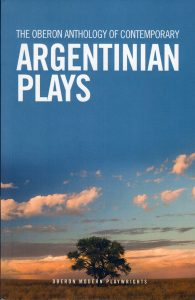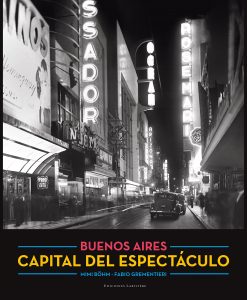I am currently studying Spanish and planning a trip to Buenos Aires. I don’t know when I will make this trip. International travel still seems a bit risky because so many flights are being cancelled. I’m not in any rush because it will take me a long time to improve my Spanish.
I am now researching the theaters of Buenos Aires. According to Wikipedia, “the city is home to hundreds of bookstores, public libraries and cultural associations (it is sometimes called ‘the city of books’), as well as the largest concentration of active theaters in Latin America.” I have found this to be the case. Buenos Aires has an impressive number of theaters. The number of commercial theaters is comparable to Broadway and I imagine the alternative theater community is also substantial. Most of the theaters are along the Avenida Corrientes on either side of the Obelisco.
I like researching the theaters of Buenos Aires because it seems like a mysterious, exotic world which nobody knows much about. Of course, this is not true. The English speaking world may show little interest in the theater of Buenos Aires, but it is hardly unknown. Generally is does not make sense to take an interest in the theater of a foreign country because you cannot attend any performances there. After all, you are not going to fly down to Argentina just to catch a show when something strikes your fancy. There is not much point in concerning yourself with performances which take place in distant countries. You have to be physically there to see anything. But since I actually like to read plays, I can enjoy the dramatic literature of a distant country just through reading. Of course, I cannot read Spanish yet but there are a few plays available in translation.
Now that I am studying Spanish, I have been surprised to discover how few Spanish plays have been translated into English. Every very famous plays which are significant in Spanish theater have never been translated. I suppose this makes sense since a play will never be translated unless there will be a production of the play. For example, the play Las Meninas by Antonio Buero Vallejo has never been translated into English even though this is a major play.
Fortunately I have found a few books to get me started. I have read the play Stupidity by Rafael Spregelburd. This book was published by Oberon Modern Plays and is one of the few contemporary Argentine plays to be translated into English. Rafael Spregelburd is also a film actor. I have seen two of his movies; El crítico and Los adoptantes. The Oberon Anthology of Contemporary Argentinian Plays is another book available from that publisher. I have bought this book but I have not read it yet.

I have also bought the book Registers: Collected Plays & Other Writings by Federico Leon. This book was published by Adriana Hidalgo Editora. It is entirely in English.
But perhaps my greatest acquisition is Buenos Aires Capital del Espectáculo by Mimi Böhm and Fabio Grementieri. This is a massive and thick coffee table book full of lavish full page photos of Buenos Aires’s performance spaces. It has photos of stages, theater seating, and theater exteriors. This book was very expensive. It cost me over $100, but you would not want to buy this book in Buenos Aires because it is too heavy to put in your luggage. I find this book very inspiring. It also shows you just how impressive the theater establishment is in Buenos Aires. If you think of Buenos Aires as being an impoverished South American country, you are very much mistaken. However, the country has faced serious economic issues with high inflation for decades.

To conclude, I should explain why I am fascinated by the theater of Buenos Aires. First, Argentina is a lot like the United States. It was settled by Europeans who exterminated most of the indigenous people. Argentinians are mostly white people of European heritage. Their culture is a mix of Italian and Spanish influences with some Irish, English and other nationalities. The city is a modern city with a subway system, skyscrapers, rock music, and television networks. Buenos Aires is sort of what New York City would be like if everyone spoke Spanish and lived in the Southern Hemisphere. Everything about Buenos Aires is familiar yet slightly off making it seem like an alternative reality. Although it is difficult to get information about its culture and theater community, it is not impossible. I feel like I am exploring some obscure aspect of the world that most people don’t know anything about. You can be objective about a foreign culture since you are not enmeshed in it and don’t have an emotional stake in the society. I find myself less opinionated and angry about what goes on in Argentinian society, even though it is clearly messed up and dysfunctional. I’m pretty discouraged about the direction that theater is going in, in this country, so I’m looking abroad for a theater I can still dream about.